Discover the quirks of some of McMaster’s oldest and newest buildings
When McMaster’s Hamilton campus first opened its doors in 1930, it consisted of five buildings: University Hall, Hamilton Hall, Wallingford Hall, Edwards Hall, and the Refectory. These buildings were designed in the Collegiate Gothic style and inspired by universities such as Oxford and Cambridge.
The ornamental stonework featured on University Hall and Hamilton Hall is typical of the Gothic architectural style. These two buildings were designed by architect William Lyon Somerville. The carvings above the University Hall Arch (pictured) depict students wearing graduation caps.

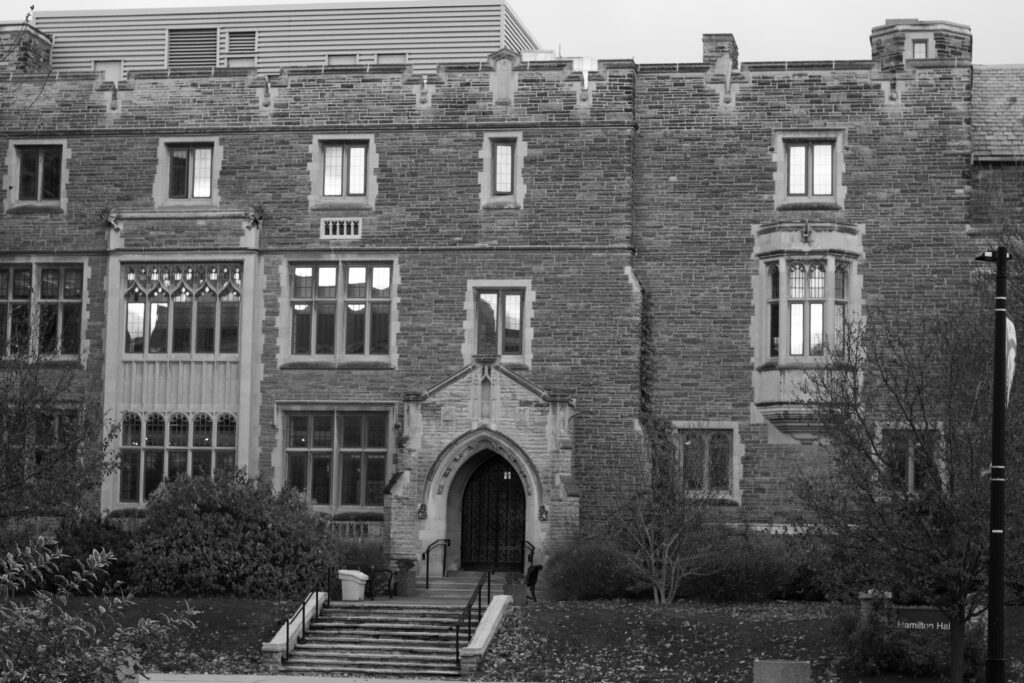
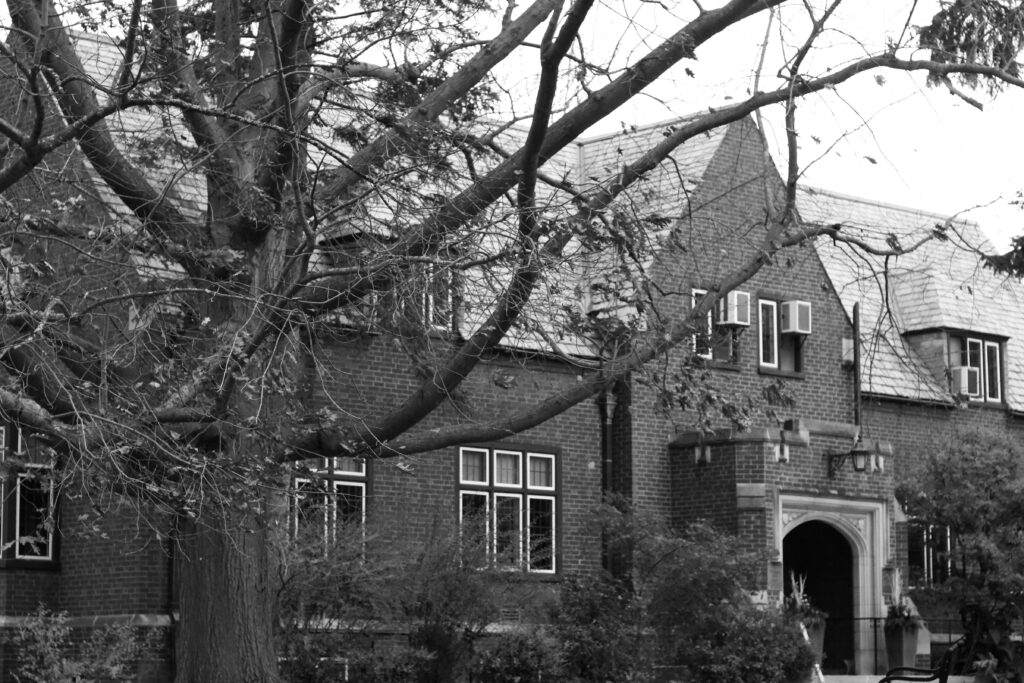
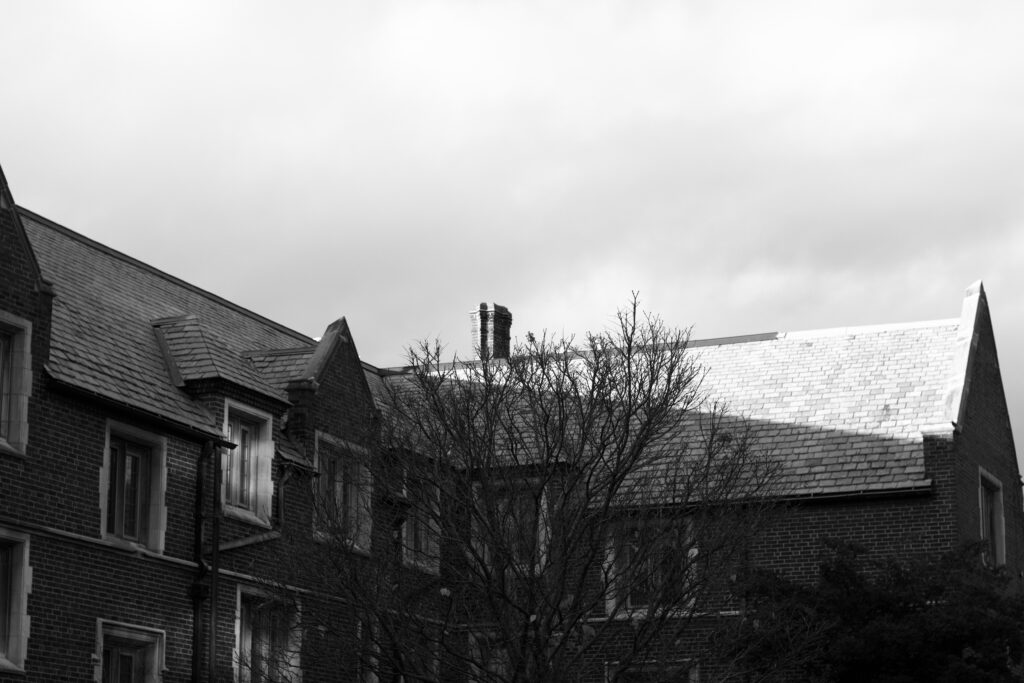
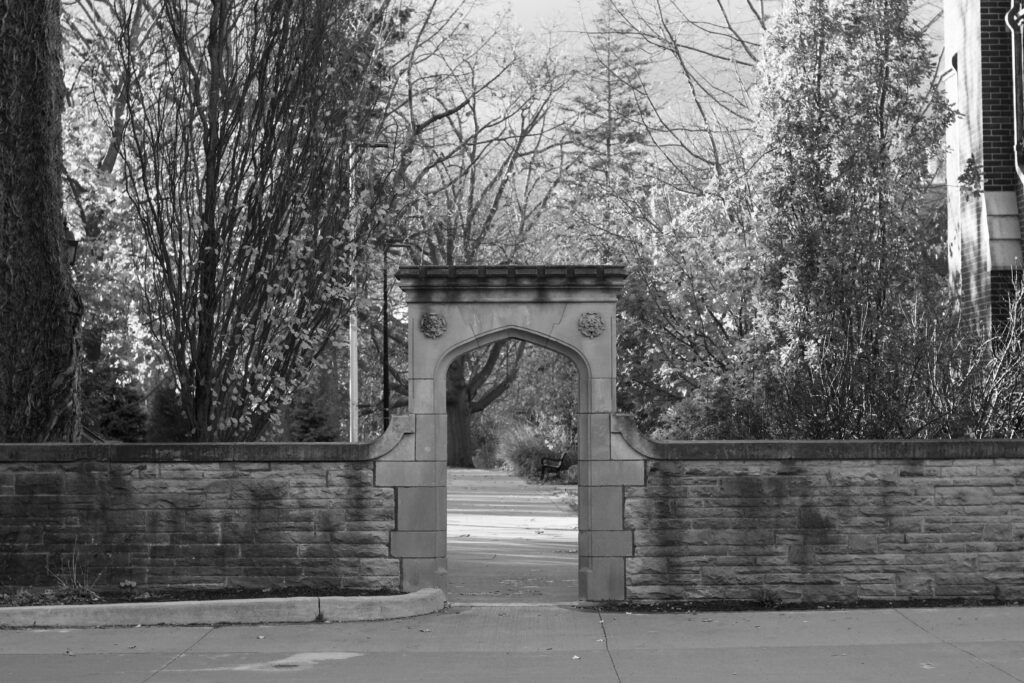
The McMaster Health Sciences Centre was designed by architect Eberhart Zeigler, with the intention of “never being finished.” The interior of the building was designed without the need for structural support walls, allowing for future modification.
This building was designed in the Brutalist architecture style that emerged in the mid-1900s and first opened in 1972.
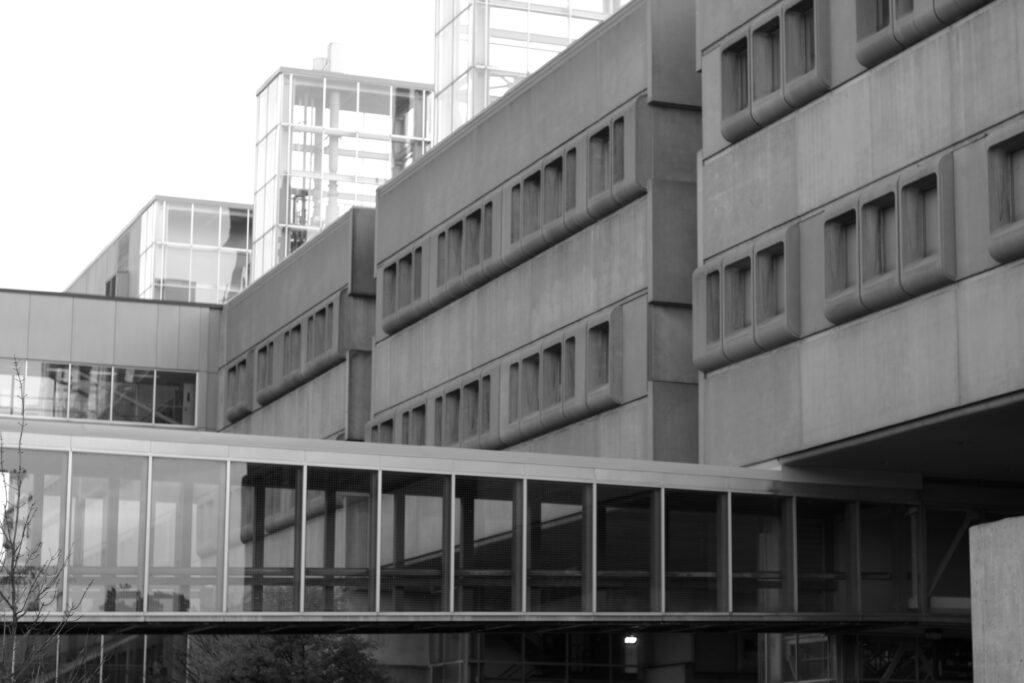
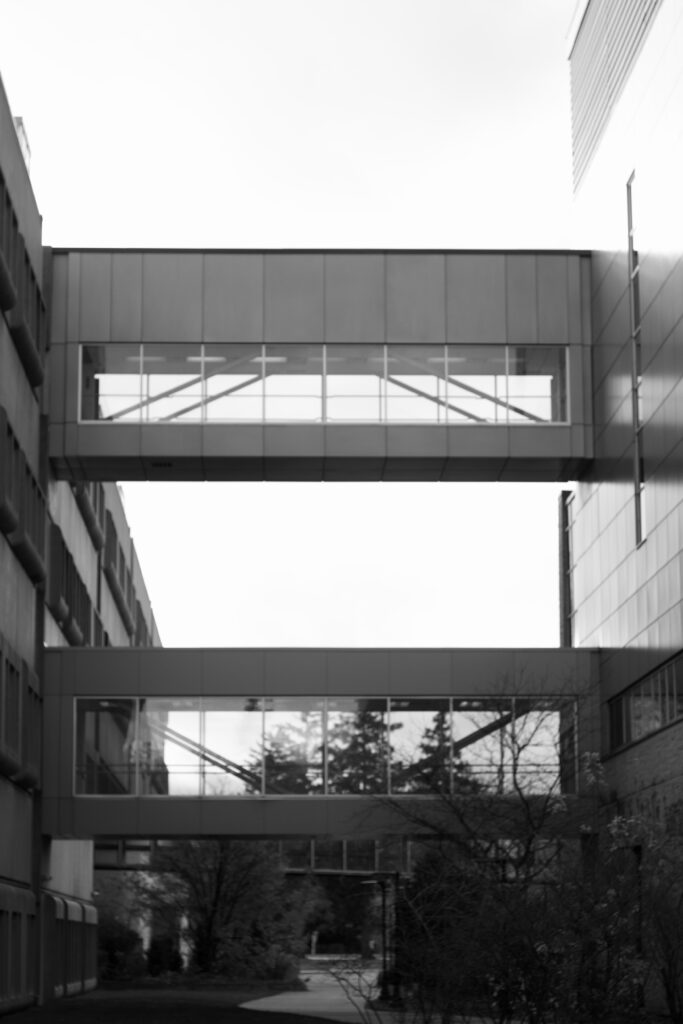
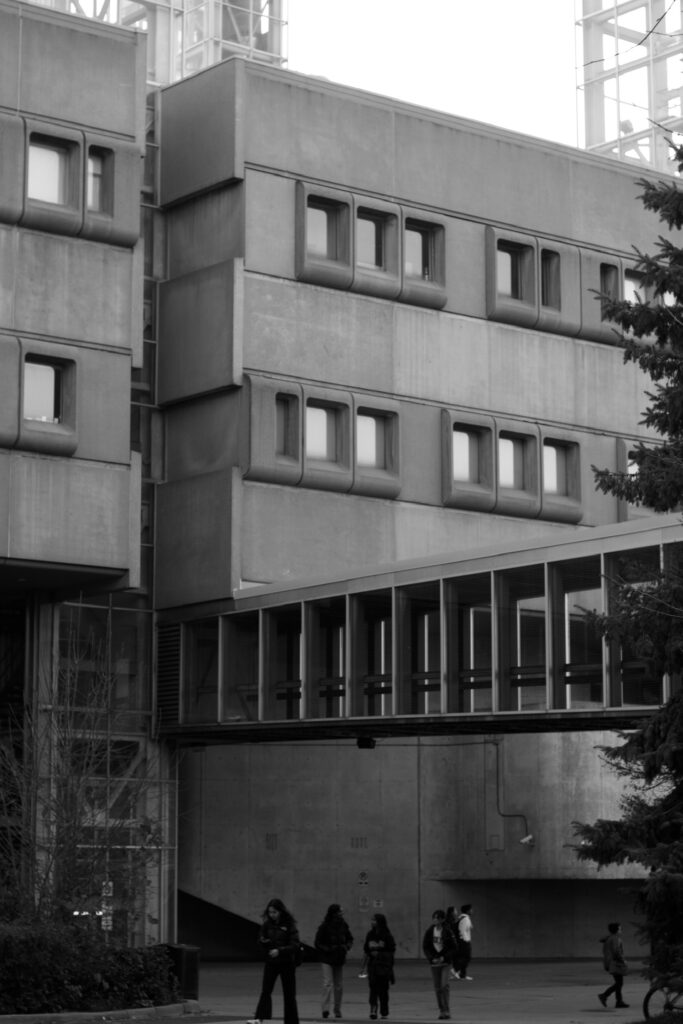
Among McMaster’s newest buildings are The Hub (2024), the Peter George Centre for Living and Learning (2019), and L. R. Wilson Hall (2017). L. R. Wilson Hall features a concert hall, blackbox theatre, interactive classrooms and an inner courtyard (pictured). The Peter George Centre was designed by architecture firm Diamond Schmitt. The four-storey atrium is naturally lit by a skylight and features a spiral staircase.
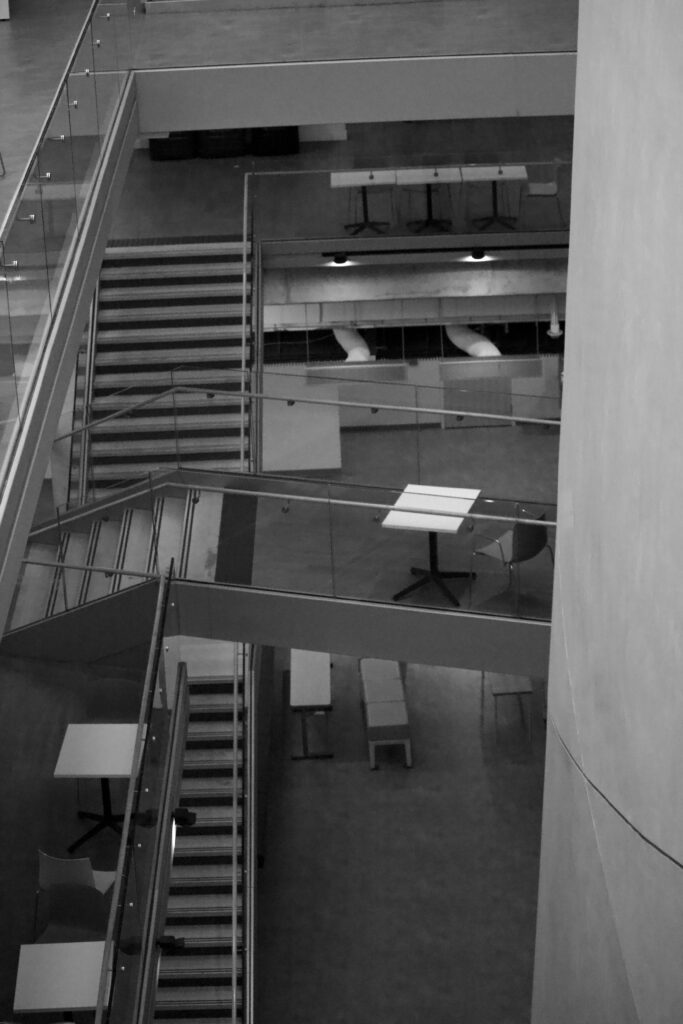
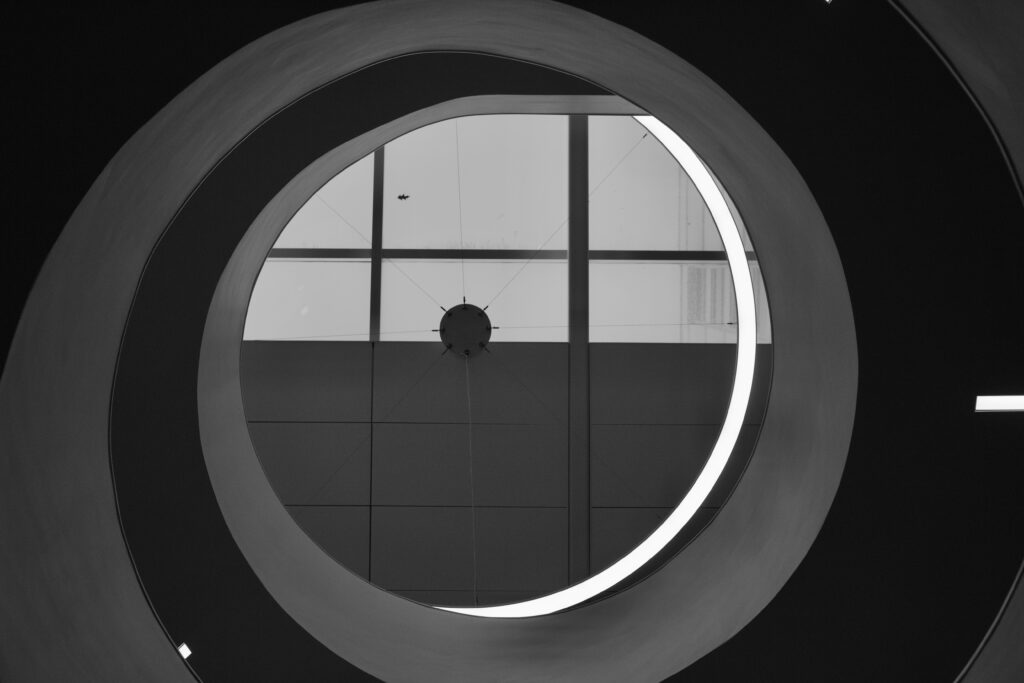
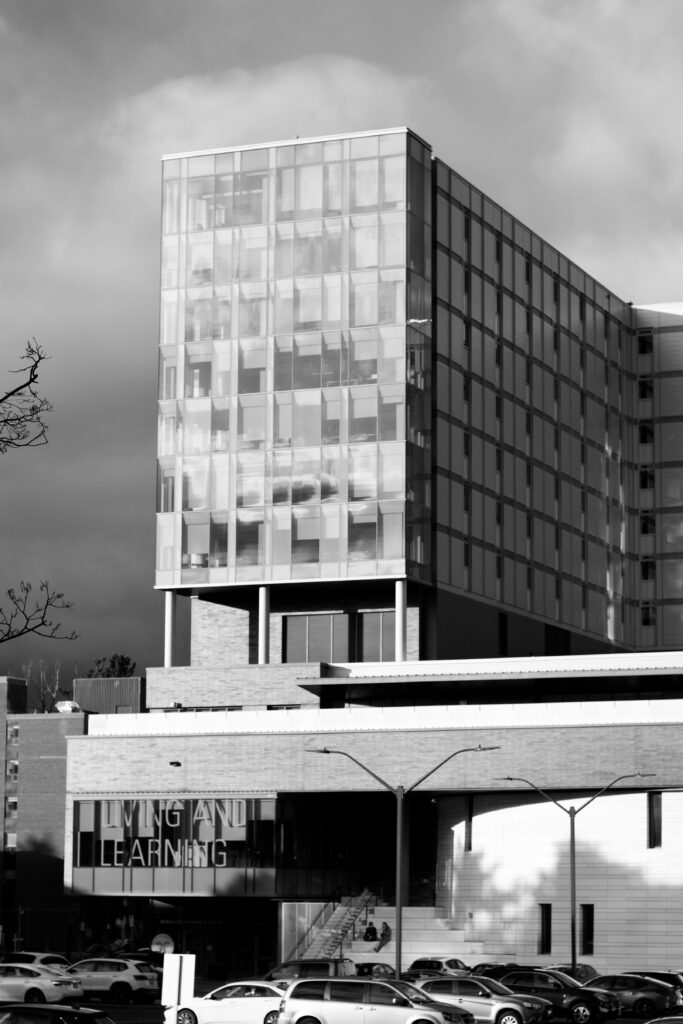
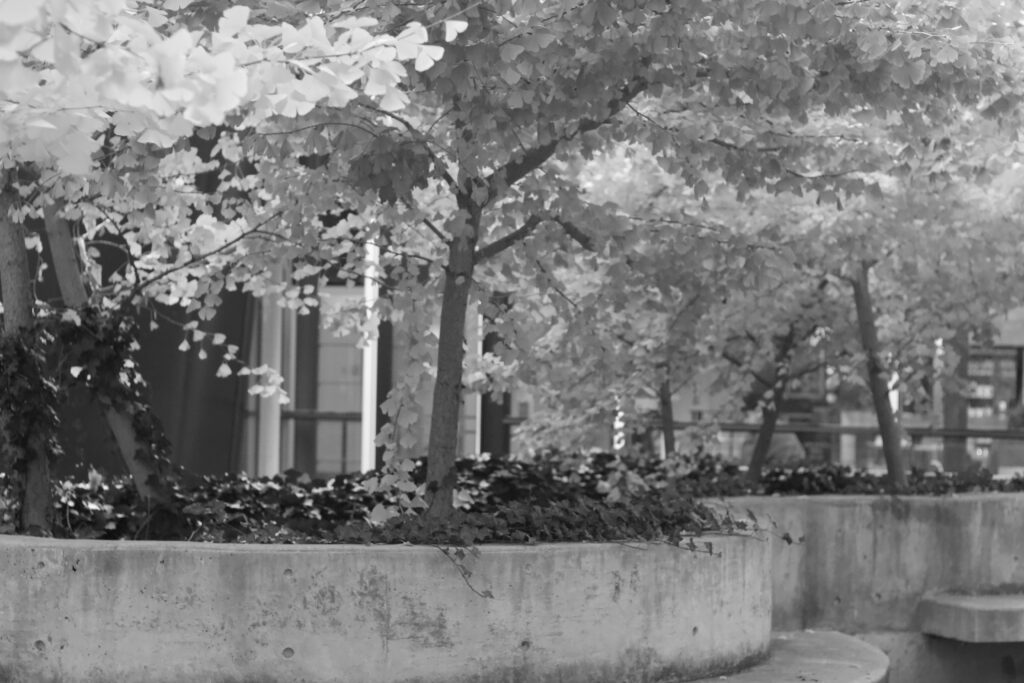
By: David Moore
 Much has been written about Peter George’s 45-year career at McMaster that culminated in an unprecedented three terms as president and vice-chancellor. I am one of many who think of him first in terms of contributions he made to benefit of students.
Much has been written about Peter George’s 45-year career at McMaster that culminated in an unprecedented three terms as president and vice-chancellor. I am one of many who think of him first in terms of contributions he made to benefit of students.
He was Dean of Social Sciences when I came to McMaster and it was with his encouragement that a few of us came together to found the Social Sciences Society in 1988. He understood the potential for the MSSS and encouraged us to build an organization in our faculty that would serve students well as other faculties had done before us. Ours continues its tradition of service to this day.
When his appointment as president was announced in late 1994, his very first media interview included an unequivocal commitment to build a new student centre. He called it “a moral responsibility of the University.”
Students had been paying capital fees since 1988. Those of us who had been project advocates for years had found our champion.
The path forward to build much needed, non-academic student space was fraught with challenges. Peter put his reputation on the line and led the external fundraising campaign seeking millions of dollars for what would eventually be the MUSC and the DBAC to build on the commitment students had already made with continuing contributions and mitigate additional student costs.
Governing is about making difficult decisions and the calls he had to make were not always popular. After a decision about the student centre’s location was made publicly before it was shared with student leaders, he stood before the SRA and took his lumps – for the better part of an hour. He understood how keenly the issues were felt and the importance of not letting a short-term disagreement derail long-term benefits to students. It was one of the defining moments that made the MUSC possible.
During his 15 years as president, Peter was a fixture at student and alumni events. He revelled in celebrating their achievements. He was not born an extrovert, but early in his career, he learned the art of mixing with varied audiences and put that ability to good use on campus and in wider areas for the benefit of our university.
McMaster has announced that the new Centre for Living and Learning will be named in Peter’s honour. By both sheer size and the scope of its mission, it is worthy to bear the name of one of McMaster’s most remarkable leaders.
After conferring an honorary doctorate on Peter last Friday, Chancellor Labarge remarked that until the next convocation in May he would be the lone member of the Class of 2017 – a man in a class by himself.
Those of us who have known Peter well for so many years knew how right she was a long time ago.
David Moore is a former president of both the MSSS and MAPS. He has been president of the MSU Alumni Association since 2001.
In the midst of a large research university, some disciplines may get lost in the shuffle. But this year is the time for Mac’s arts to be in the spotlight.
McMaster’s School of the Arts is launching a yearlong festival designed to highlight the arts and their role in the university. The Spotlight on the Arts festival will see eight months of events, including lectures, exhibitions, and theatre productions.
Virginia Aksan, former Acting Director of the School of the Arts and one of the main coordinators of the festival, sees it as an opportunity for the department to be more vocal on campus.
“My vision was to promote the [image] of School of the Arts —which surprisingly, very few people know about,” she said of the reasoning for the event.
School of the Arts was created in 2001 to amalgamate the departments of Art and Art History, Music, and Theatre and Film Studies, a move Aksan considers to be primarily economically driven. But she also believes they hold a further connection.
“They share a vision about human creativity that I think is so much part of downtown Hamilton now,” she explained.
And it’s this vision that she has seen flourish under the leadership of current university president Patrick Deane, whom she describes as a “huge fan of the arts.”
Aksan felt that the leadership of Peter George, president previous to Deane, left something to be desired when it came to arts education. Deane began his role as president in 2010.
“What Peter George did was to create a university that was internationally renowned in heart research or in health studies,” she said.
“[But] the humanities… are the continuity of intellectual life of the human, and we kind of take it for granted. We’re in an age when we can’t have that happen anymore.” She added that she hopes to remind people “Mac does things besides what it’s renowned for.”
While the purpose of the Spotlight festival is chiefly to promote the work of School of the Arts, the project has been “building and growing from the original purpose to stimulate more arts based activity,” said Beth Marquis, another of the lead coordinators of the festival.
Marquis serves as a professor in the Arts and Science program, in the School of the Arts, and works at the McMaster Institute for Innovation and Excellence in Teaching and Learning (MIIETL). She sees the festival as an opportunity to create more connections within the McMaster community, between disciplines and departments, especially considering the size of the university.
“It’s such a big and complex place,” she said of McMaster. “Sometimes you miss a lot of great opportunities that are happening…I think it’s just the nature of a place like this.”
The festival, with its variety of events, will be organized into four different clusters: connect (September), activate (November), empower (January), and integrate (March). Through the different themes, Marquis hopes to encourage people to think about the role of art differently.
“[We want people] not only to approach the arts as entertainment…but also [to understand] that the sense of social work while we’re being entertained.”
Photo: Studio art students printing their original T-shirt designs last year in Arts Quad. They will do the same this year at Supercrawl. C/O Anqi Shen.

Former prime minister of Canada Jean Chretien was at McMaster Innovation Park on Tuesday morning to speak about global water issues.
The event was a book launch for The Global Water Crisis: Addressing an Urgent Security Issue, a publication from the United Nations University Institute for Water, Environment and Health (UNU-INWEH). The book was produced alongside the Walter and Duncan Gordon Foundation and the InterAction Council, of which Chretien is a member.
Also in attendance was former McMaster president Peter George, who chaired a panel discussion following talks from Chretien, UNU-INWEH director Zahar Adeel and Thomas Axworthy, who is President and CEO of Walter and Duncan Gordon Foundation and the Secretary-General of the InterAction Council. UNU-INWEH is hosted at McMaster University.
Chretien, who spoke after Adeel and Axworthy, expressed his concern over the coming global fresh water shortage, mentioning that Canada has 20 per cent of the world's fresh water.
"We might regret that nobody paid attention to this problems when it started ... and I have a feeling that we can find solutions, but we should not start to do that too late. It's better to start right away. We might avoid international crisis," said Chretien. He explained that the recommendations in the book were key to the solution.
Alex Rockingham & Karianne Matte
Silhouette Interns
The Council of Ontario Universities has honoured former McMaster President Peter George with the David C. Smith Award.
The award is granted to those who have worked to improve education and research.
Bonnie Patterson, the council’s president, described him as “a passionate leader,” who “transformed McMaster University with his focus on excellence in teaching and research and his vision for internationalizing the student experience on campus.”
Patterson also commended him for being a staunch advocate of the advancement of research during his tenures on the Council of Ontario Universities and the Association of Universities and Colleges of Canada.
George, who retired in 2010 after serving three terms as the University’s president, has also been awarded the Order of Canada, the Order of Ontario and honorary degrees and honours from numerous universities in Canada and abroad.
At his celebratory dinner, George described the award as a “great honour,” and said that he enjoyed working with the students, and faculty of the University.
The award itself is named after the late Dr. David C. Smith, a Mac alumnus who contributed to both scholarship and public policy regarding university education. Dr. Smith, who passed away in 2000, had a very strong connection to McMaster University.
While completing his undergraduate degree at McMaster in the early ‘50s, Smith served as Marmor Editor and MSU president.